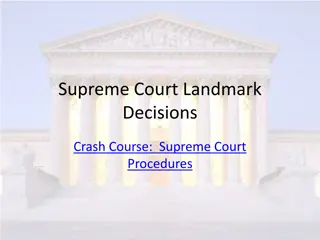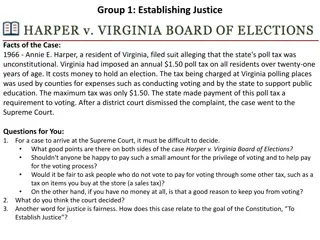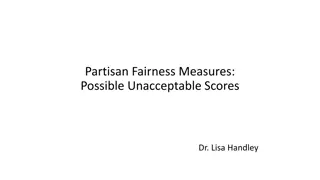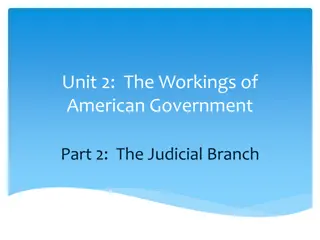Colorado Property Tax Distraint Sale Mobile Homes Analysis
Recent U.S. Supreme Court decision impacts Colorado's property tax laws, potentially unconstitutional. Analysis indicates mobile home sales may be deemed unconstitutional unless certain criteria are met. Proposed amendments aim at moratorium and task force creation to address current issues related
0 views • 11 slides
Landmark Supreme Court Cases: Marbury v. Madison & McCulloch v. Maryland
Marbury v. Madison (1803) and McCulloch v. Maryland (1819) are two pivotal cases in Supreme Court history. Marbury v. Madison established judicial review, giving the Court the power to declare laws unconstitutional. McCulloch v. Maryland upheld federal supremacy over state laws. These cases exemplif
1 views • 14 slides
Supreme Court Decisions on Voting Rights
The cases of Harper v. Virginia Board of Elections and Burson v. Freeman presented challenges to voting rights laws. In Harper v. Virginia, the Supreme Court ruled the poll tax as unconstitutional, stating it unfairly restricted voting access based on financial means. On the other hand, in Burson v.
0 views • 10 slides
Understanding Judicial Activism and Judicial Review in Legal Systems
Judicial activism involves the use of judicial power to benefit society, expanding judicial review to declare laws unconstitutional. The courts need to be active to protect constitutional rights, as the executive and legislative branches may fail in their duties. Judicial activism in India, through
0 views • 9 slides
Analysis of Partisan Fairness Measures and Efficiency Gaps in Redistricting Plans
This analysis delves into partisan fairness measures and efficiency gaps in various redistricting plans challenged in Ohio, Pennsylvania, Wisconsin, and Michigan. Dr. Lisa Handley and other experts discuss thresholds for unconstitutional plans and the impact of lopsided margins. The Efficiency Gap,
0 views • 7 slides
The American Judicial Branch: Structure and Judicial Review
The American judicial system consists of District Courts, Appellate Courts, and the Supreme Court. District Courts handle initial cases, Appellate Courts hear appeals, and the Supreme Court is the highest authority. Justices are nominated by the President and confirmed by the Senate. Judicial review
0 views • 12 slides





